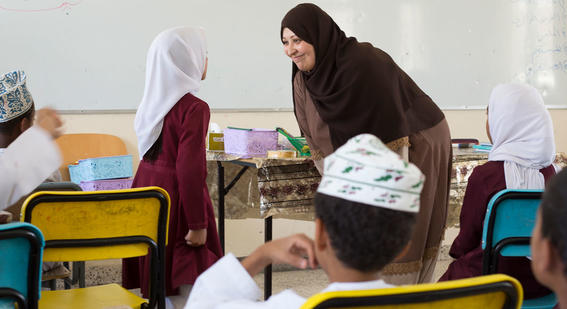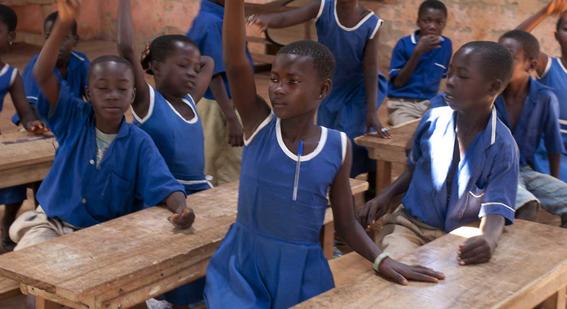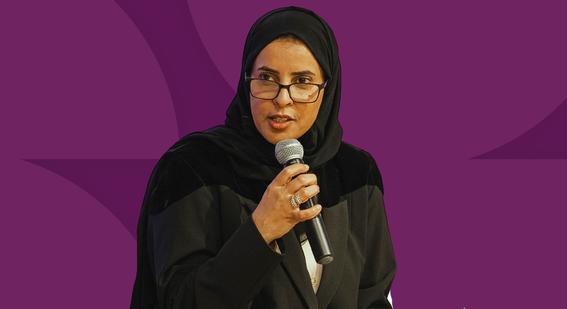International Literacy Day: strengthening education systems to support literacy
Driven by her passion to make a difference in teaching and learning, Dima Zeidan, started her career teaching English as a second language to young learners. She later transitioned to teaching Arabic as a foreign language at university level and developing Arabic first language resources. Currently, she is the Arabic Solutions Manager for Partnership for Education at Cambridge.
This International Literacy Day, Dima shares her insights on key focus areas for education leaders.

In my first year studying Education at the American University of Beirut, I helped organise a ‘reading day’ for children from remote areas of Lebanon. One of the children who came along was a young boy called Omar. He had travelled from a remote orphanage to attend the event, where students read to children who had limited access to books of their own.
Omar couldn’t read or write yet but as we turned the pages together, his face shone at the colourful illustrations. He was laughing at the characters and asking questions about things he had never seen before. Omar still held the book tightly after the event ended. What I remember most is that he enjoyed reading the book even more than the snacks we brought.
Reading with Omar and seeing his joy has made me realise that literacy is never just about the words on a page. It’s about building connections, exploring new ideas and developing the ability to approach the world with curiosity. On days like today, where we mark International Literacy Day with the theme ‘Promoting literacy in the digital era,’ I think of Omar and how important it is to give every child the chance to read.
Why literacy matters
A recent University of Cambridge study of 10,000 children showed that children who read for pleasure from an early age had better cognitive skills, stronger mental health and healthier brain development. They showed more progress in areas such as memory and language and were less likely to experience stress or behavioural problems. The study also found that reading 12 hours per week in childhood was optimal for these developments.
The Early Years Library developed by Cambridge’s Centre for Play in Education, Development and Learning (PEDAL) suggests that early-years literacy helps children to better prepare for school. When paired with language, numeracy, self-regulation and social-emotional skills, children are set up in a much better position for success in future learning and mental health.
As I saw with Omar, through reading, children can experience new emotions, relationships and events safely. This helps them process different ways of feeling and behaving. It boosts imagination, improves creativity and fosters problem-solving skills.
Projects like ‘Thinking Together’ developed by Professor Neil Mercer, Dr Lyn Dawes and Professor Rupert Wegerif emphasise that literacy is not just about reading but is also about developing effective communication and reasoning skills. Children who lack these skills are more likely to feel frustrated which can lead to behavioural issues or exclusion in school settings.
How education systems can make a difference in literacy
Literacy is the key to achieving inclusive and equitable education. It’s a cornerstone of United Nations Sustainable Development Goal 4 (UN SDG4) and lifelong learning for all. Guided by this goal, communities, schools and governments are making progress to help children develop the literacy skills they need. But there are still areas where many learners need more support. Research shows it can be effective to focus on:
- Early literacy: creating language-rich environments from early years gives a foundation for reading and writing skills. Storytelling and interactive play, at home or at nurseries, help children develop vocabulary and love for reading before formal school begins.
- Teaching pedagogy: millions of children around the world attend school but do not gain basic literacy skills. Simple attending school is not enough. The quality of teaching and learning experiences is crucial. Modern, interactive and student-centred approaches increase children’s motivations and help them gain confidence in reading, writing and problem-solving skills.
- Mother-tongue education: is key to strengthening literacy, promoting cultural pride and social inclusion. Learning in your mother-tongue improves identity development.
- Inclusive education: inclusive programmes and resources empower children living in rural areas, refugees, girls and learners from low-income families and boosts their literacy skills.
Literacy in Arabic-speaking countries
Literacy looks different in every part of the world. It is shaped by culture and communities that speak the local language. Improving literacy looks different too.
For example, in the Arab-world, we face a unique set of challenges and opportunities. Arabic is a beautiful language that carries a rich culture and heritage. Part of this is Arabic’s diglossia and the fact that children read and write in a variety of Arabic they do not speak at home – Modern Standard Arabic.
In the 21st century, children learning Arabic are usually operating in multilingual environments. Their formal schooling, digital media and caregivers may all function in different languages or dialects – often with multiple languages in the same environment. Whereas in some countries, children will primarily consume television, speak to their sports coach, and engage on social media in their mother tongue – the picture for lots of children in the Arab-world is more varied. In this landscape, it is more important than ever that we look closely at how we are teaching and learning Arabic.
Across education systems, improving the quality of Arabic teaching in schools and informal learning spaces by working closely with teachers, parents and students can have a big impact. So can creating more high-quality engaging resources designed specifically for the local context across both print and digital. This is something that’s been a key part of our work with the Ministry of Education in Oman.
Partnership to boost literacy
We are at an important moment for global literacy, and Arabic literacy. Looking ahead, I am excited by the possibilities of working with educators and partners to help all children develop the connection, skills and joy that come with literacy. This is especially so across the Middle East and North Africa, where I am based in Dubai.
As a working parent, I always feel the guilt of not having enough time to play with my children or teach them everything. Yet, despite this, I feel proud that I have succeeded in instilling the love of reading. Wherever we are, they always want a book. Currently, finding interesting and engaging Arabic books and stories continues to be a challenge. While I have seen them more interested in learning Arabic, especially now that they formally study it at school, in the absence of fun resources, they will mostly pick up English stories. I can see impressive commitment across the region to change this, as leaders, organisations, educators and teachers increase awareness of the importance of reading in your mother tongue language.
The Reading for Pleasure Conference in the UAE, the closest event to my heart, is one that I look forward to every year to see the great ongoing progress to increase reading opportunities for children. The Emirates Literature Festival and multiple children’s bookfairs are also events that bring us to discover the talented authors that are starting to create great resources in Arabic.
Literacy is also a fundamental part of the conversation when it comes to education system transformation – from the UN General Assembly to the Education World Forum.
Over the coming year, my colleagues and I will be bringing Cambridge’s expanding body of evidence to these conversations and solution design and delivery. I’m looking forward to working hand-in-hand with our partners to drive forward collective efforts that boost literacy across the region and beyond.




